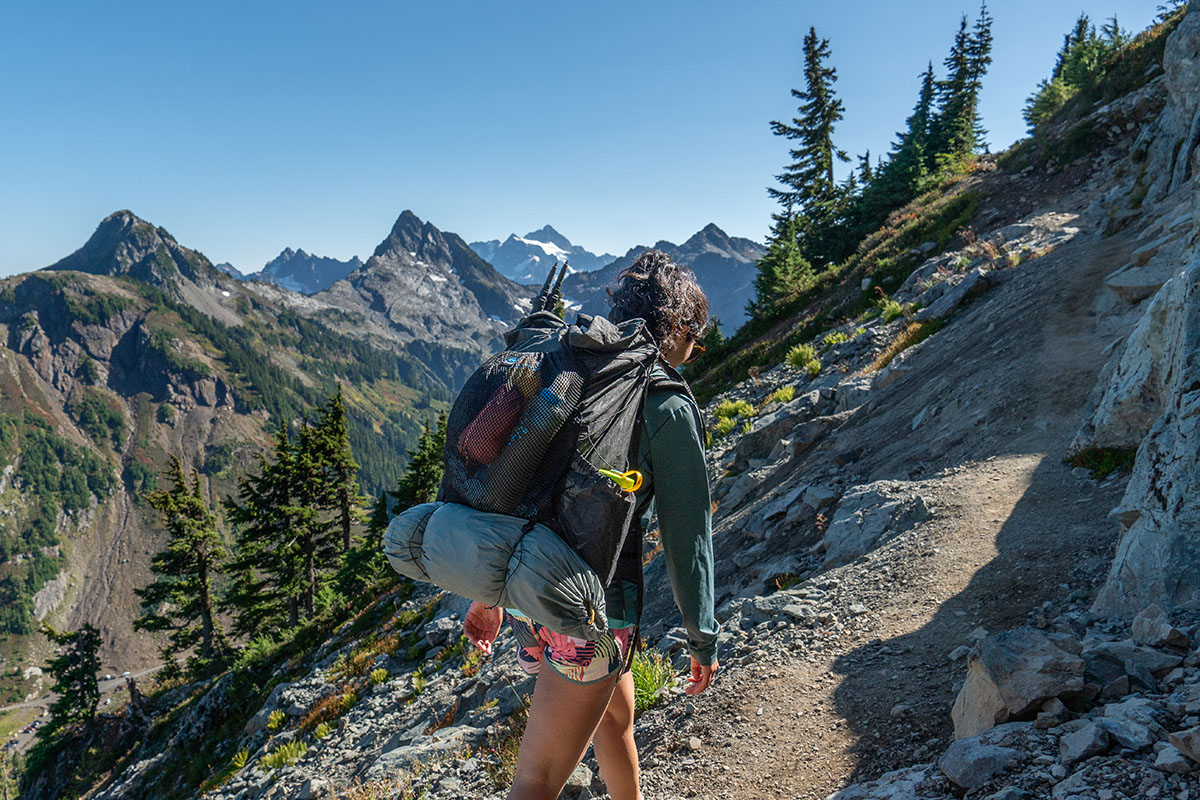

Switchback Travel (Eric de Paoli)


Switchback Travel (Eric de Paoli)
Price: $399
Weight: 1 lb. 5.4 oz. (short torso and medium hipbelt)
Fabric: 3.3 oz./sqyd Ultra 100
Capacities: 40, 50, 60, 70L
What we like: Super light, strong water resistance, great backpanel ventilation, and carries up to 30 pounds well.
What we don’t: Limited organization in the base setup; long-term durability concerns with the thin fabrics and small components.
See the Zpacks Arc Haul Ultra 60L
Zpacks is a leader in the UL pack market, known for mixing innovative suspension platforms with ultralight fabrics. The Arc Haul is a mainstay in their lineup, and it got a recent revamp with the switch from Dyneema to Ultra 100, a high-molecular weave that promises increased durability and waterproofing compared to its forebearer. We tested the 60-liter version in the Pacific Northwest and came away impressed: The pack is supportive, super lightweight, and offers excellent ventilation, although we experienced some fit-related issues and the numerous straps, buckles, and stitching have us concerned about long-term durability. Below we break down our experiences with the Arc Haul Ultra 60L. To see how it stacks up to the competition, see our articles on the best ultralight backpacks and best backpacking backpacks.
Editor’s note: The Arc Haul Ultra that we tested was made with Ultra 200, which is a thicker version of the Ultra 100 fabric featured on the current version. We cover the differences in more detail in the Build Quality and Durability section below.
Zpacks is known for making some of the lightest packs on the market, and the Arc Haul Ultra 60L is no exception: Our 60-liter pack came in at a feathery 1 pound 5.4 ounces with a short torso and medium hipbelt (it’s listed just 0.3 oz. lighter with those same components). Compared to other packs in its class such as the popular Hyperlite Mountain Gear Southwest 55 (1 lb. 15.6 oz.), Gossamer Gear Mariposa 60 (1 lb. 13.4 oz. for a size small with a medium hipbelt), and ULA Equipment Circuit (2 lb. 5.3 oz.), it’s remarkable that the Zpacks maintains a similar capacity at nearly half a pound lighter. In fact, it’s only marginally heavier than some popular frameless packs, which is truly impressive.

This lightness is achieved by a combination of thoughtful design choices and an innovative use of materials. First and foremost, the Arc Haul Ultra uses a relatively new-to-market fabric called UltraWeave (Ultra for short). Compared to Dyneema, Ultra is touted as being more resistant to tears and abrasion, slightly lighter, and waterproof in most realistic backcountry scenarios (more in "Build Quality and Durability" below). Additionally, instead of aluminum stays, Zpacks uses pre-bent carbon that also saves weight. Finally, the Arc Haul Ultra features a spartan design that eschews creature comforts like hipbelt pockets, internal/external organization options, and other modern features. To be fair, they do sell these accessories for purchase separately, which allows users to customize the pack to their specific needs without incurring any unnecessary weight penalties.
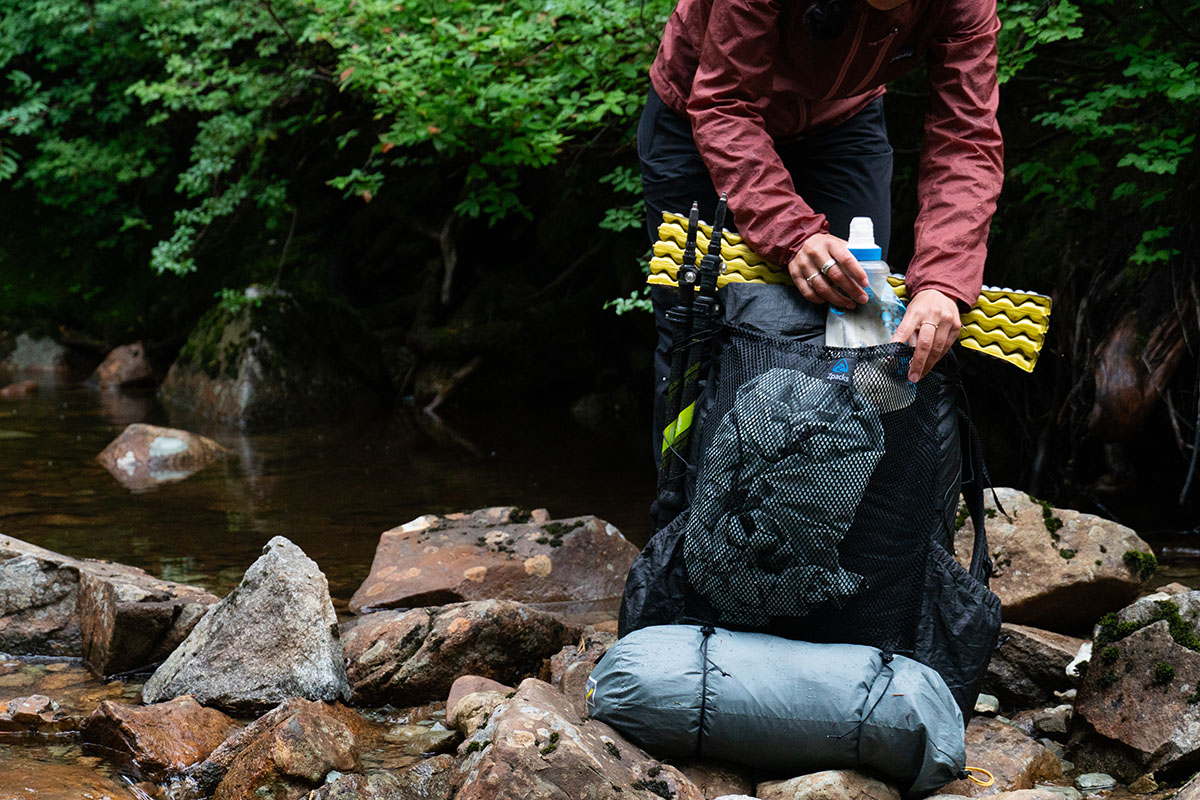
I put the Zpacks Arc Haul Ultra through its paces on everything from gear-intensive day trips to a 60-mile backpacking loop in coastal British Columbia with a load of around 30 pounds. The pack remained highly comfortable throughout, though it did feel a little overburdened as I got closer to the 40-pound maximum load rating. The shoulder straps are wide and nicely padded, and the stiff frame effectively distributes the load and places most of the weight on the hips. The V-style hipbelt was another highlight, allowing each strap to adjust independently to fine-tune the fit. Finally, the load lifters add additional adjustments to bring the weight closer to your center of gravity, which is particularly helpful when shuttling heavier loads. Even when stepping over logs or navigating uneven terrain, the pack remained snug and close to my body.
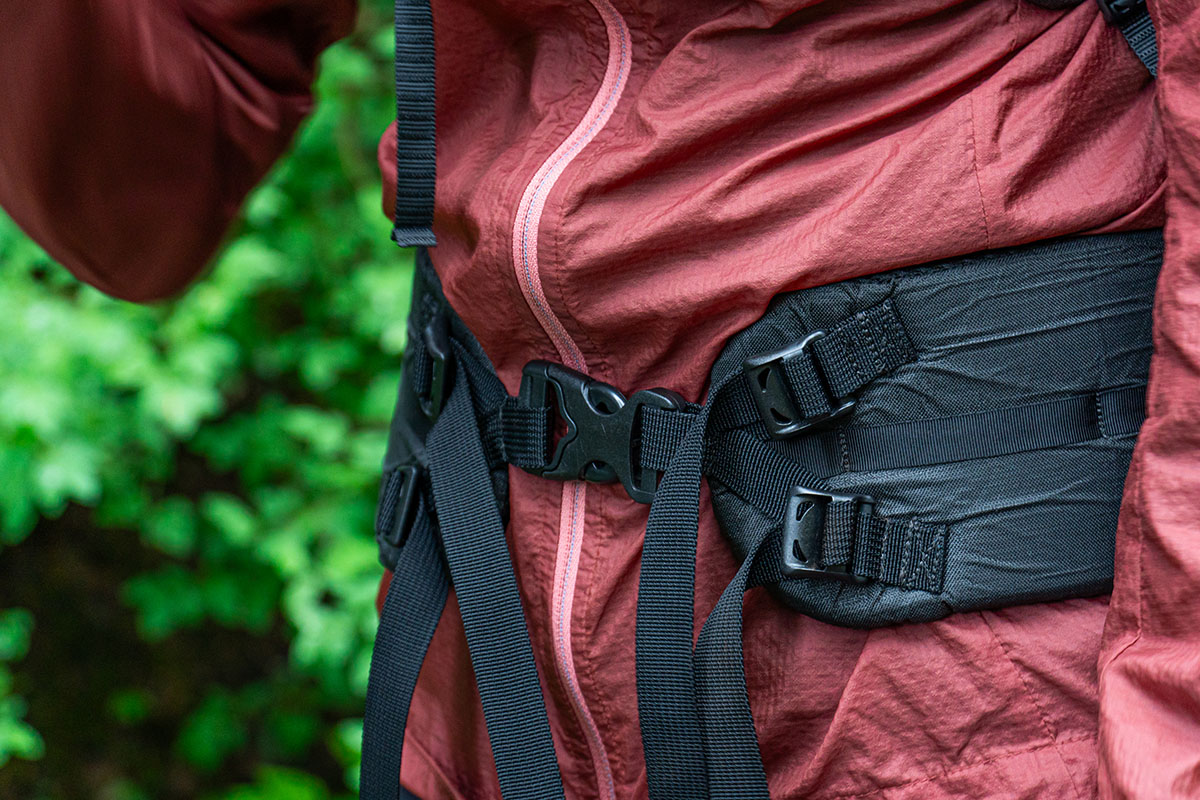
While overall comfort was quite good, I did come away with some fit-related complaints. Since I was at the upper end of the torso range (the short torso has a range of 16 to 19 in., and mine is 18.5), the buckles on the backpanel dug into my shoulder blades. No matter how many adjustments I made, I couldn’t get rid of the uncomfortable pressure points. My partner who also wore the pack (but who has a 17-in. torso) had no issues with the fit, which leads me to believe that the size range is smaller than Zpacks suggests. If you’re on the fence or have particularly broad shoulders, I recommend sizing up or contacting Zpacks beforehand to dial in the right fit.
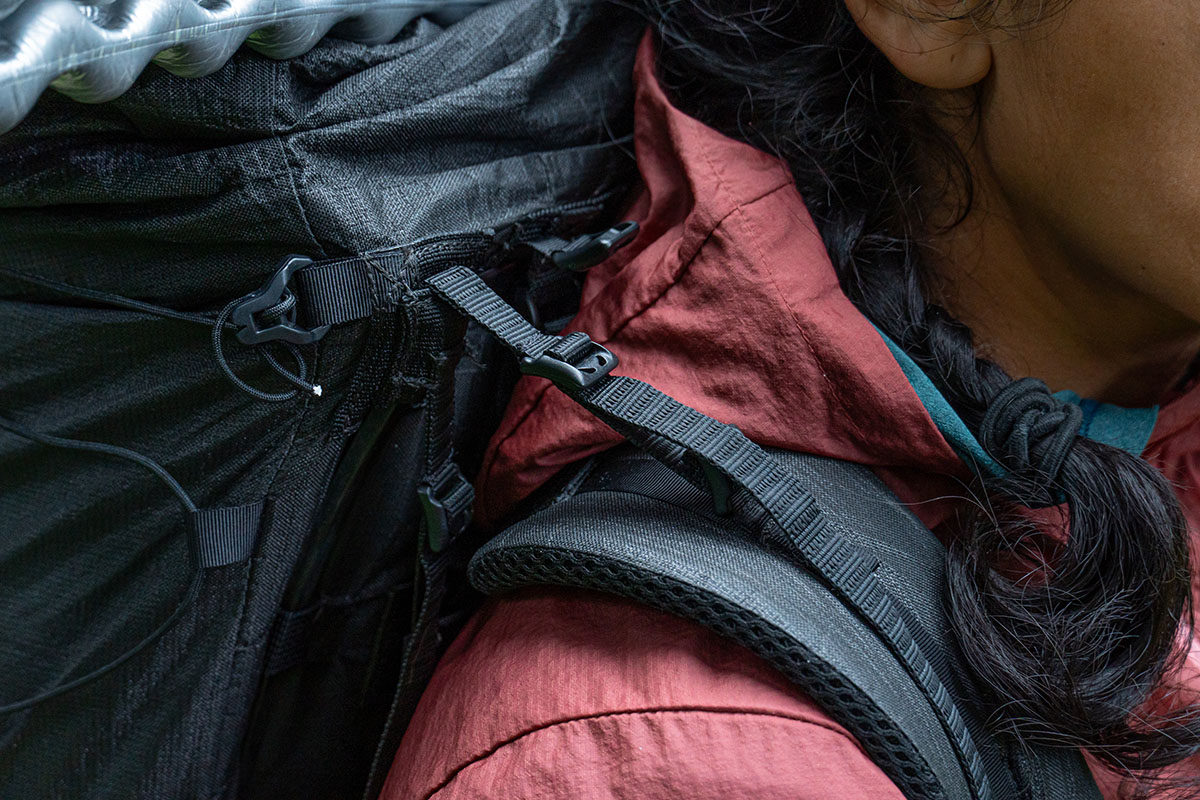
During testing, the Zpacks Arc Haul Ultra easily swallowed up to five days’ worth of food and gear with room to spare for longer trips or colder outings that require more layers. The 60-liter capacity is split between 47 liters in the main body, 2.5 in each side pocket, and 8 in the front mesh pocket. Like many other UL designs, the Arc Haul’s interior comprises just the main compartment with a handy roll-top closure that’s easy to expand or cinch down depending on the size of your load.
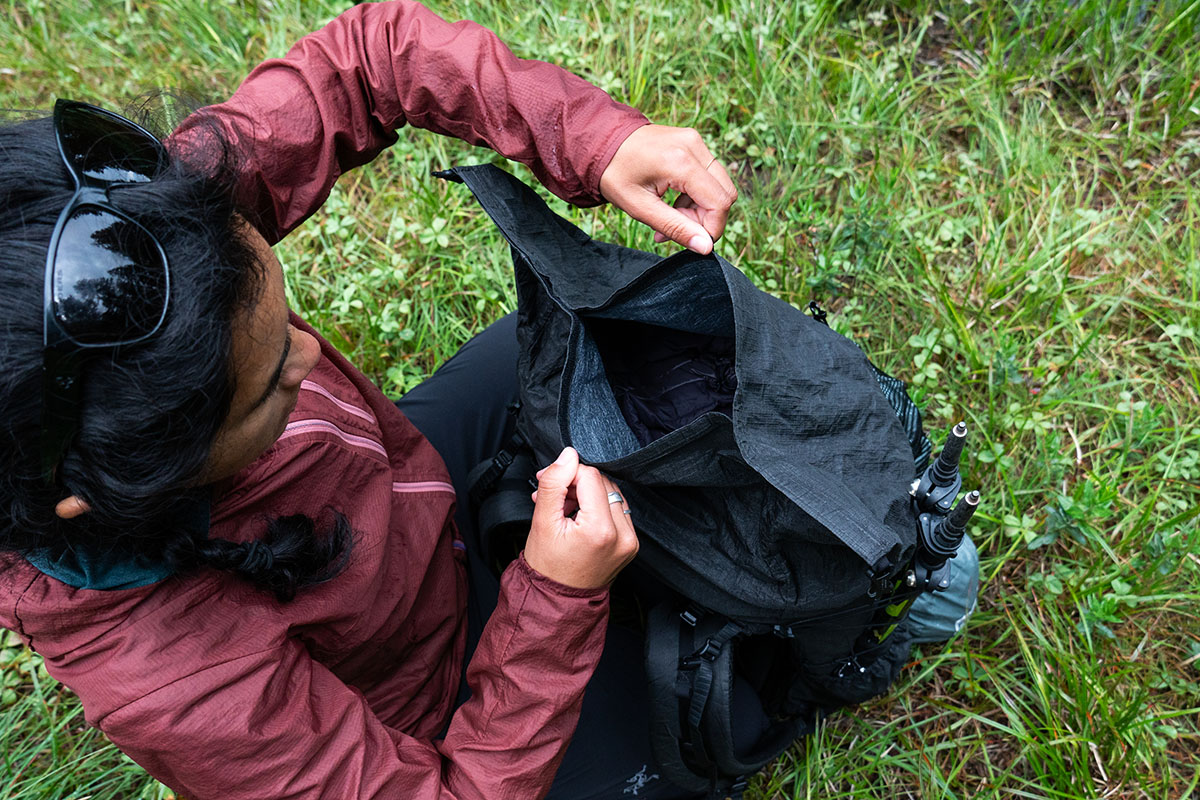
The exterior features some thoughtful organization details, but again, Zpacks kept them to a minimum to reduce weight. The front mesh pocket is large enough to stash any essentials we wanted to keep accessible throughout the day—such as a rain shell, water filter, snacks, or cook kit—and has enough structure to it that we never worried about items falling out (not always the case with minimalist UL designs). Just below the mesh pocket are two cord straps, which we found helpful for strapping a tent or foam sleeping pad to the pack. Finally, daisy chain loops run along the hipbelt and shoulder straps and were handy for attaching items like a satellite messenger or camera clip.
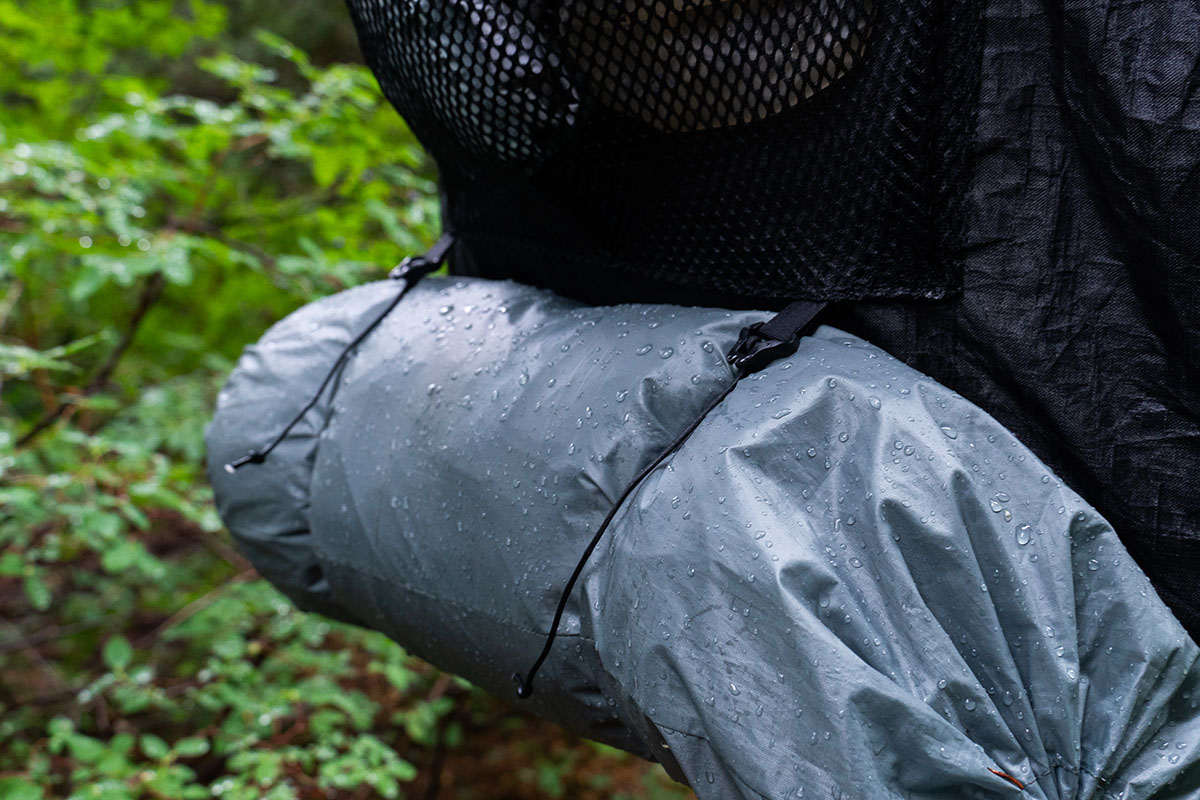
In the end, we found the Arc Haul’s storage layout to be largely functional but wish Zpacks included more options for on-the-go organization. One notable omission is hipbelt pockets, which come standard on many other UL packs. As we mentioned, Zpacks does offer modular add-ons—including hipbelt pockets, shoulder pockets, and extra straps and cordage—but they all come at an additional cost (and the pack itself is already pricey at $399).

One of the Arc Haul Ultra’s standout features is its backpanel design, which does an impressive job promoting airflow while keeping weight to a minimum. The system comprises two pre-curved carbon fiber stays that suspend the backpanel away from your back while still transferring most of the load onto your hips. Zpacks pairs this with a panel of stretchy Lycra mesh for additional breathability, which can be tightened or loosened to adjust the tension (it also provides some support and cushion from the contents of the pack).
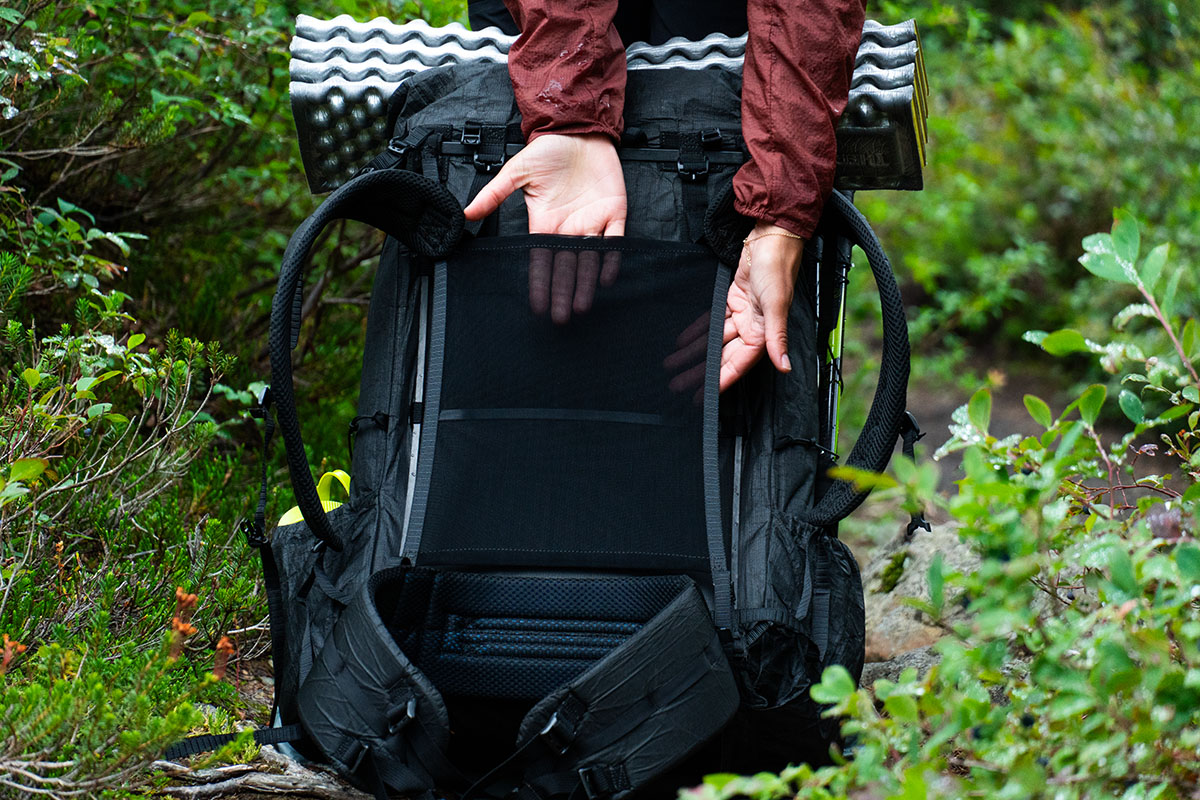
In practice, I found the backpanel design to be very effective at keeping me cool and comfortable while hiking. As someone who runs hot, I often find my back saturated with sweat (especially with more common foam backpanel designs), but the Arc Haul Ultra did a great job at keeping air flowing—a welcome relief when backpacking in cooler temperatures when hypothermia was a possibility. The exaggerated angles of the carbon stays did lead to some minor weight distribution issues (it felt as though more of the load was on my lumbar than my hips at times), but the boost in ventilation is worth that trade-off, in my opinion.

There’s no getting around the fact that ultralight equipment needs to be treated with more care than conventional (read: heavier) gear, and the Zpacks Arc Haul is no exception. First, it’s important to note that I tested a previous version of the pack that was made with 3.5 ounce-per-square-yard Ultra 200, which is comprised of tightly woven 200-denier (D) Ultra High Molecular Weight Polyethylene (UHMWPE) laminated to a waterproof lining. The current version uses 3.3 ounce-per-square-yard Ultra 100, which has a similar makeup but with a noticeably thinner (100D) face fabric. The advantage is a drop in weight, although you’ll need to take added care to avoid snags and punctures.
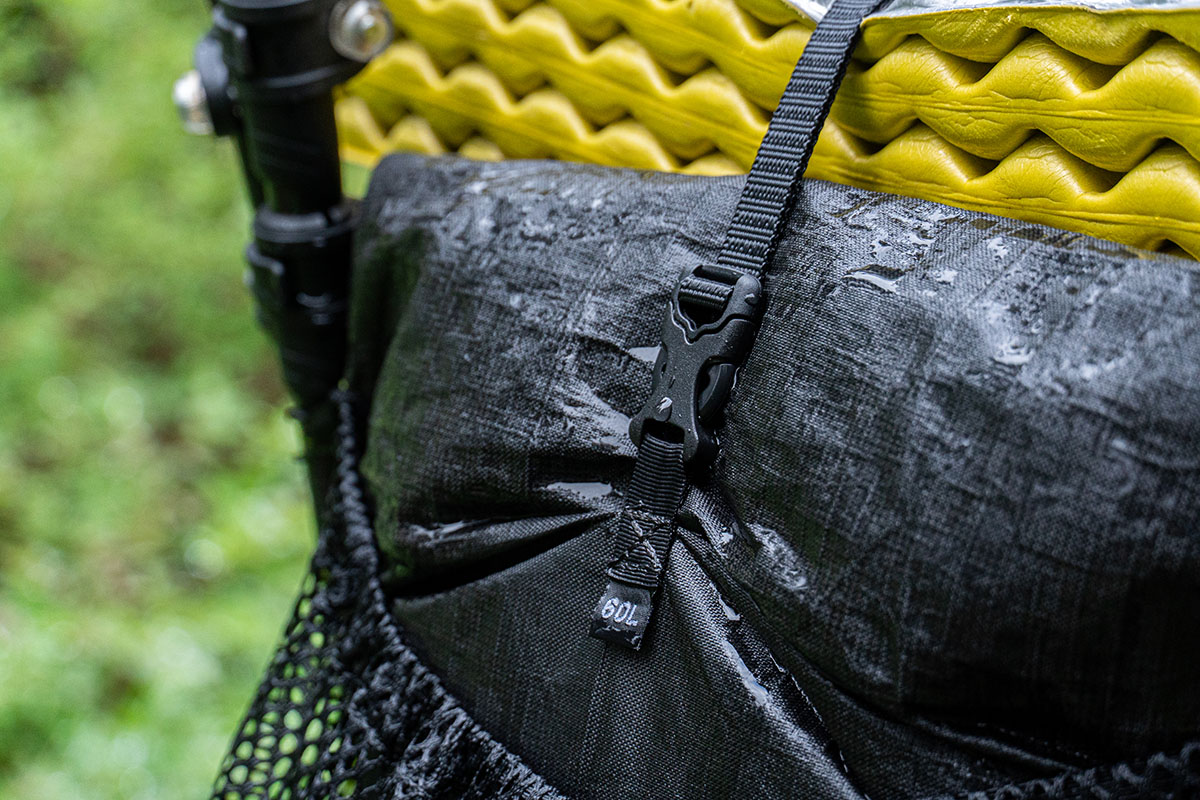
Despite its fairly thin feel, my pack held up extremely well to bushwhacking through thick alders and scraping against rocks and trees when venturing off trail. It also proved to be highly waterproof and never allowed any moisture to seep into the pack, even when exposed to prolonged drizzles for days on end (typical of the PNW). Finally, all seams and attachment points are taped for added weather resistance and durability—a nice touch that some UL manufacturers forgo. Again, the current version of the Arc Haul is notably thinner than the model I tested (and many other ultralight backpacks, for that matter), but it’s not egregious by any means and should hold up well if you exercise reasonable caution.
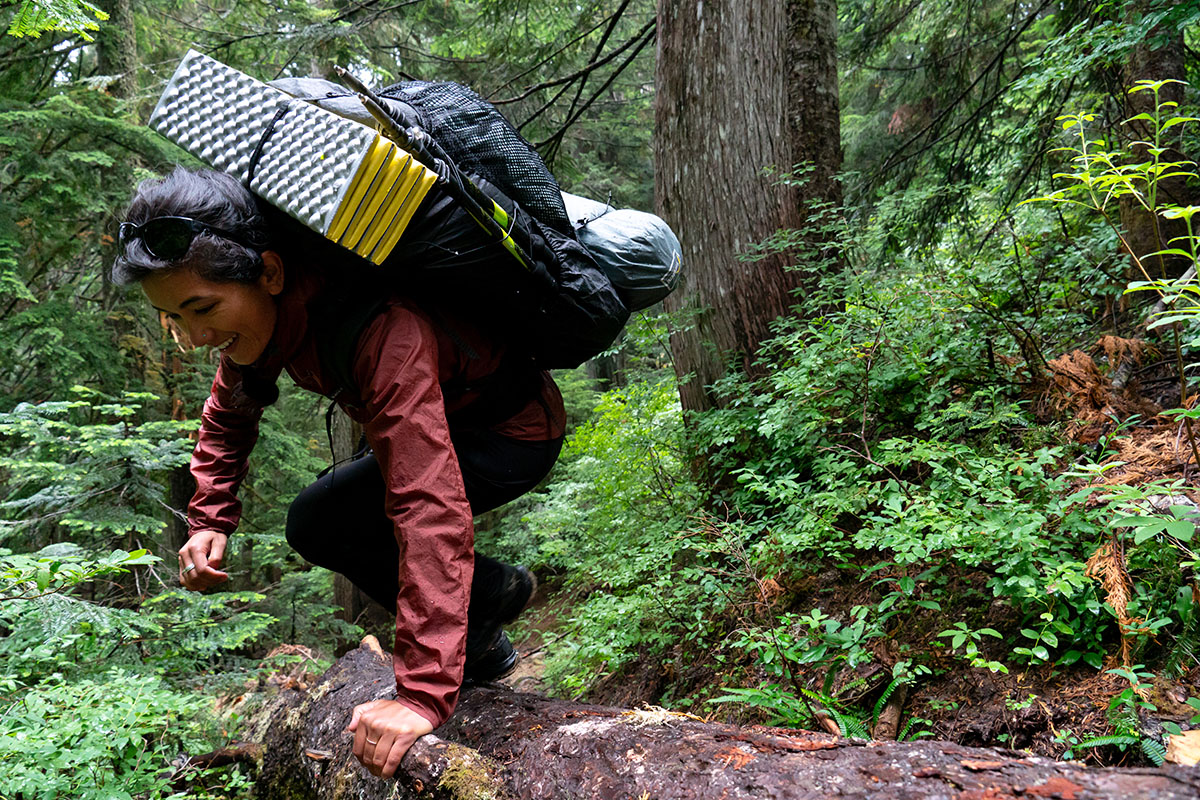
In terms of downsides, most of our concerns center around the complexity of the design: There are numerous straps, buckles, and stitching that could potentially fail over time. To be fair, we haven’t had any issues to date, although there are some loose threads on key weight-bearing straps after considerable use. Being careful to not overload the pack is a good way to avoid problems over the long term, and Zpacks also offers a two-year warranty that covers any defects in materials or workmanship (the loose threads on my pack likely wouldn't be covered).
Fit customization is hallmark of many ultralight designs, and the Arc Haul Ultra fits the bill with three torso lengths (ranging from 16 to 26 in.) and four hipbelt sizes (25 to 55 in.) to choose from. Importantly, the hipbelt is easy to swap out, which is great for those in between sizes or who want to share the pack with a friend. For tweaking the torso length, it’s as easy as tightening or loosening the buckle at the top of each shoulder strap. Like the hipbelts, each torso size has a range of adjustability: 16 to 19 inches for the size small, 19 to 23 inches for a medium, and 23 to 26 inches for the tall. For visual learners, Zpacks has several video tutorials breaking down all of the potential fit adjustments.
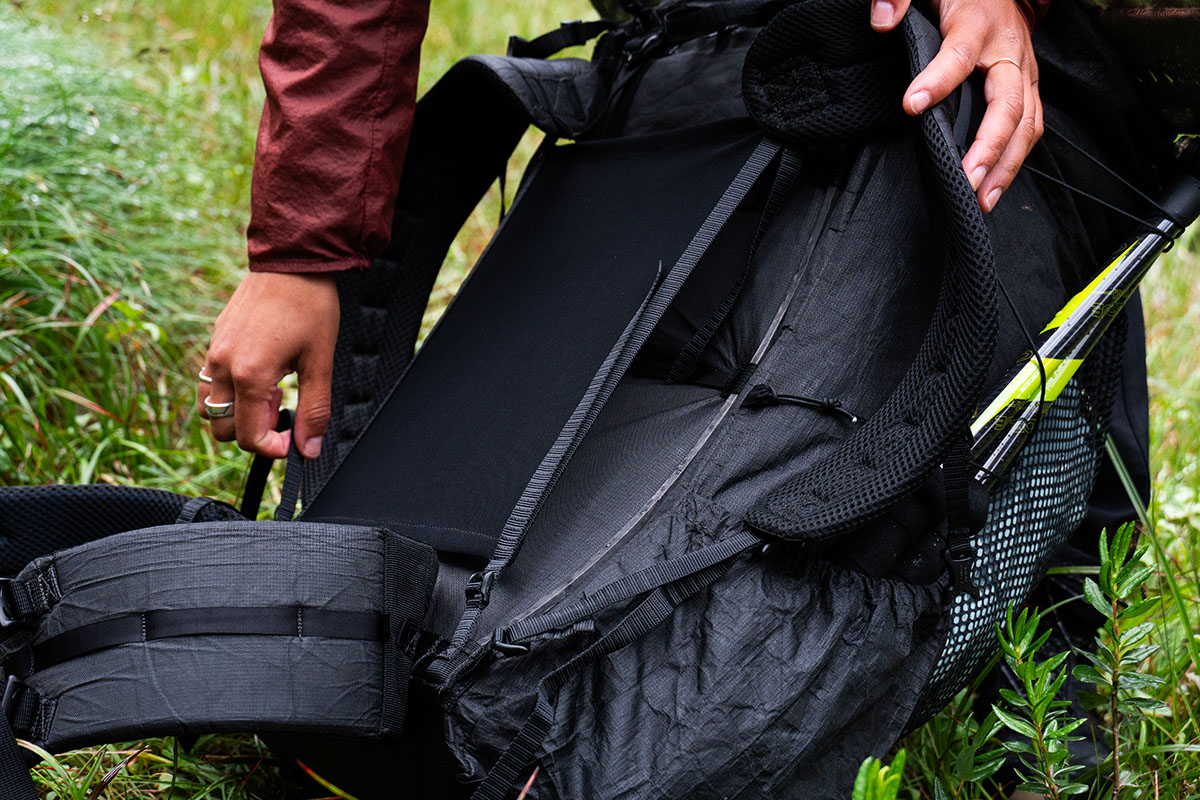
Though I’m 6 feet tall, my torso measures 18.5 inches, so I opted for the small torso size. This meant I could share the pack with my partner, who has a shorter (17-in.) torso. For reference, the pack offered ample adjustments to fit both of our frames, and dialing in fit was a quick and painless process. The mesh backpanel can also be moved up or down to allow for optimal airflow. As I mentioned above, I did experience pressure points along my shoulder blades from the backpanel buckles digging in, which was likely a result of being at the upper end of the size range. But my partner had a pain-free experience, which leads me to believe that sizing up would have solved my issues.
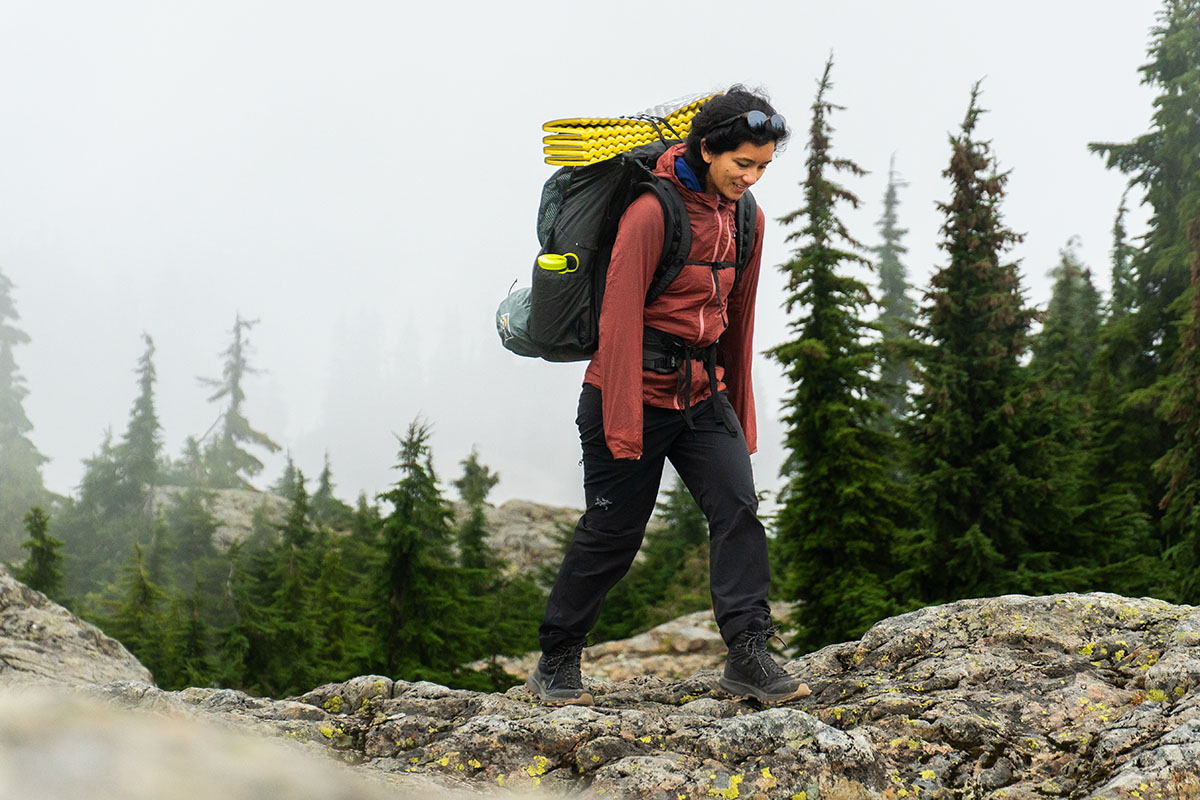
We tested the Arc Haul Ultra 60L for this review, and it also comes in 40, 50, and 70-liter capacities, along with a 60-liter women’s-specific model. Each pack costs the same at $399 for the base model with no accessories. For those with truly ultralight kits, the smaller-capacity versions weigh marginally less: The 40-liter model checks in at 1 pound 4.2 ounces (with the same short torso length and medium hipbelt), while the 50-liter version is 1 pound 4.8 ounces.
On the flip side, stepping up to the largest Arc Haul 70L will only incur another ounce or two depending on which size torso and belt you choose. Zpacks also offers a women’s Arc Haul Ultra 60L for those with smaller builds, which has shorter and thinner shoulder straps and will fit torsos from 16 to 19 inches. Finally, the Arc Zip Ultra 62L is a little pricier ($449) and heavier (1 lb. 7.8 oz.) than the Haul versions but comes with a U-shaped zippered panel at the front for easier access to the interior.
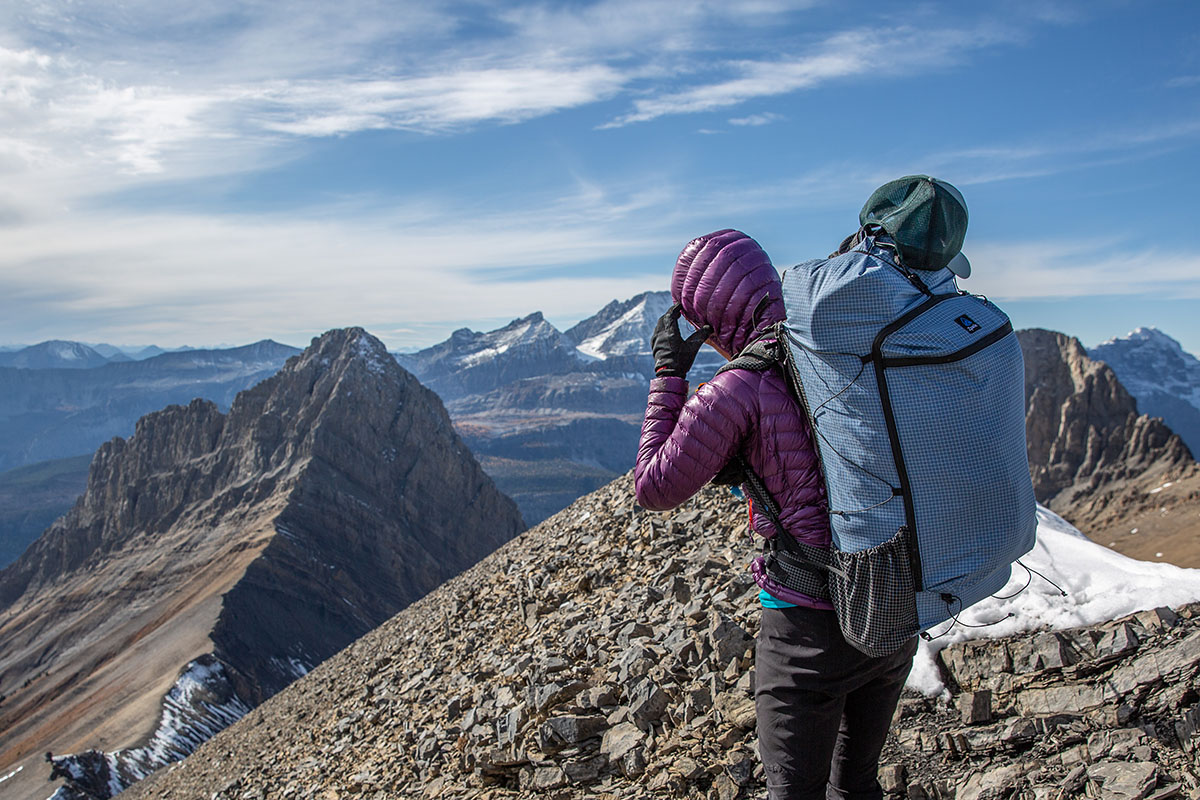
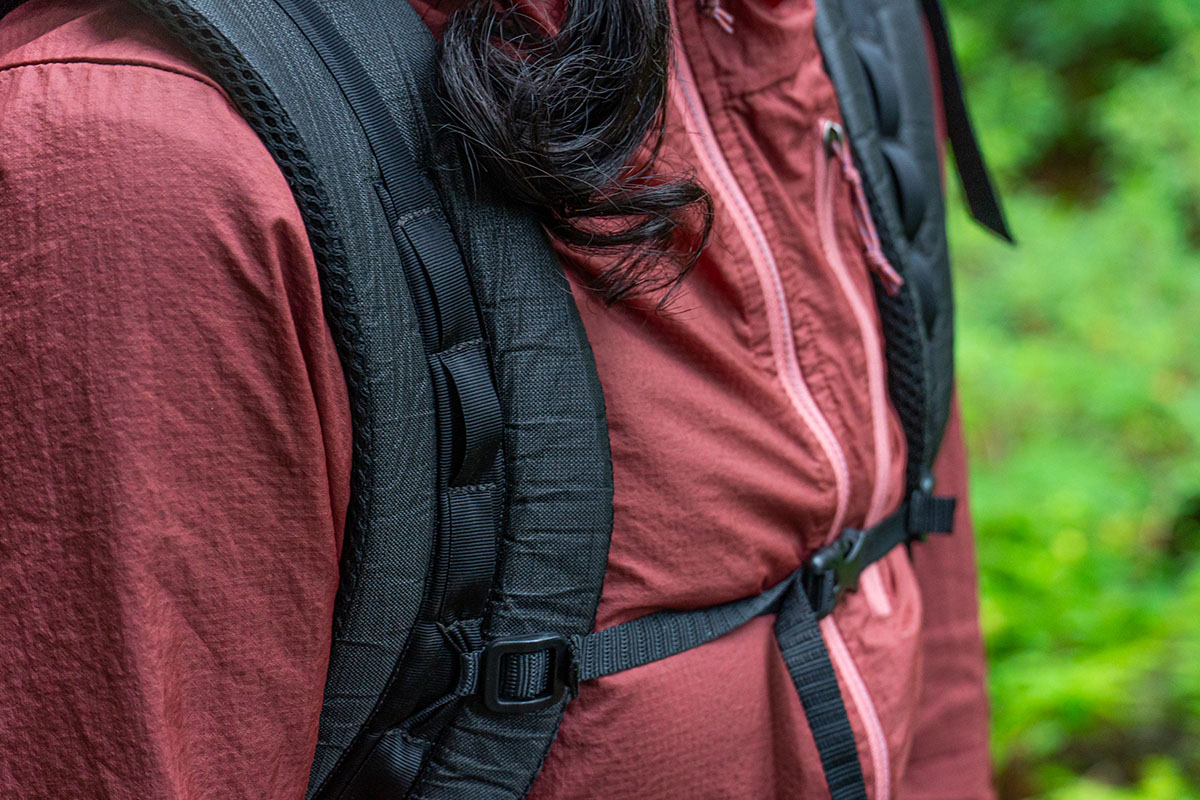
| UL Backpack | Price | Weight | Fabric | Capacities | Load Limit | Frame |
|---|---|---|---|---|---|---|
| Zpacks Arc Haul Ultra 60L | $399 | 1 lb. 5.1 oz. | Ultra 100 (3.3 oz/sqyd) | 40, 50, 60, 70L | 40 lb. | Yes |
| Hyperlite Southwest 55 | $399 | 1 lb. 15.6 oz. | Dyneema (150D) | 40, 55, 70L | 40 lb. | Yes |
| ULA Equipment Circuit | $280 | 2 lb. 5.3 oz. | Robic nylon (400D) | 68L | 35 lb. | Yes |
| Gossamer Gear Mariposa 60 | $285 | 1 lb. 13.4 oz. | Robic (100D & 200D) | 60L | 35 lb. | Yes |
| MLD Exodus 55L | $325 | 1 lb. 2 oz. | Ultra X 100 (3.3 oz/sqyd) & Ultra X 200 (3.9 oz/sqyd) | 38, 48, 55L | 20-25 lb. | No |
Zpacks’ Arc Haul Ultra 60L is a competitive addition to the ultralight backpack market and makes fewer compromises than its weight would suggest. However, Hyperlite Mountain Gear’s Southwest 55 is our favorite UL pack this year and wins out in a few key areas. First is durability: The Hyperlite is notably thicker with a 150D Dyneema construction (the cheaper white model is much thinner at 50D) and features beefier components that have a more confidence-inspiring feel. It also gets the edge in carrying comfort—especially when maxing out the 40-pound load rating—and boasts sizable hipbelt pockets for on-the-go storage. The Zpacks is lighter by around 10 ounces, larger by 5 liters, and offers better fit customization and ventilation, but the Southwest’s advantages in durability and carrying comfort outweigh its drawbacks, in our opinion.

Another thru-hiker favorite is ULA Equipment’s Circuit, which offers an additional 8 liters of capacity for around $120 less than the Arc Haul Ultra 60L. Other advantages include more fit customization options, a thicker and more hardwearing exterior (the pack uses 400D Robic nylon), and a fuller feature set that includes dual hipbelt pockets, a port for a reservoir tube, and loops for securing trekking poles. The ULA also carries loads of up to 30 pounds very comfortably, although the padded foam backpanel offers less ventilation and separation from the pack than the Zpacks’ suspended mesh design. The Circuit is also a full pound heavier than the Arc Haul and less water-resistant, although the advantages in capacity and durability are notable. In the end, the Zpacks gets our vote for ounce-counters who have their UL kit dialed in, but the Circuit is a great value for those willing to make a couple compromises.
Next up is another cottage-industry favorite: Gossamer Gear’s Mariposa 60, which is one of our go-tos for everything from quick overnights to week-long missions. For a significant $114 less than the Arc Haul, the Mariposa is competitively light at 1 pound 13.4 ounces (for the small frame and medium hipbelt) with far better organization, including seven exterior pockets to divvy up smaller items you want close at hand. We also found it to be impressively supportive for loads up to 35 pounds, although it’s similarly thin with a mix of 100 and 200D Robic nylon and less water-resistant than the Arc Haul’s Ultra fabric. The foam backpanel was also prone to bunching up throughout the day, and many will opt to swap it out for a more rigid design. But these are relatively small complaints for an otherwise very well-rounded and feature-rich UL design, earning it higher marks than the more minimalist Arc Haul in our rankings.

Last but not least is Mountain Laurel Designs’ Exodus 55L, which is the lightest alternative here at a scant 1 pound 2 ounces (for a size medium with a similar Ultra construction and no additional pockets). The Exodus achieves this by forgoing a frame, which allows the pack to conform both to your body and loads of varying sizes—great for fast-moving ULers who have already streamlined the rest of their kit. The most glaring downside is a lower load limit of just 20 to 25 pounds, although this is realistically plenty for ounce-counters used to keeping their base weight low. The rest of the design stacks up very similarly to the Arc Haul, including a roll-top closure to access the main compartment, dual water bottle pockets and a front shove-it pocket, similarly thin Ultra fabrics, and the ability to tack on hipbelt and shoulder pockets for an additional charge. The Zpacks offers added fit adjustments and will be the more approachable design for most, but the Exodus is hard to beat for those who prioritize weight above all else.
Editor’s note: We usually provide a live price comparison table below our outdoor gear reviews, but the Arc Haul Ultra is sold exclusively by Zpacks. You can see the Arc Haul Ultra 60L page here and support us in the process. Thanks!